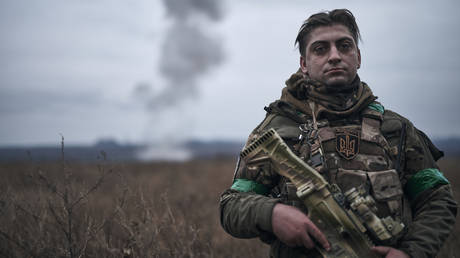Why the West Thinks It Has the Moral High Ground: "Fighting to the Last Ukrainian"
NATO aimed to deplete Russia's resources and diminish its status as a major power.

For nearly three years, NATO nations have severed diplomatic ties with Russia, all while countless lives are lost in the ongoing war in Ukraine. This choice to abandon diplomacy is morally indefensible. Engaging in dialogue could have lessened conflict, mitigated tensions, and potentially paved the way for peace. However, political and media elites have portrayed this choice as a commendable stance, branding any effort at dialogue as treachery and casting war as a noble endeavor.
NATO's strategy focuses on wearing down Russia through ongoing hostilities, with the intention of having Russians and Ukrainians inflict casualties on one another for an extended period. U.S. Secretary of Defense Lloyd Austin articulated the U.S. objective in the Ukraine war, stating, "We want to see Russia weakened to the degree that it can’t do the kinds of things that it has done in invading Ukraine." In a March 2022 interview with The Economist, Volodymyr Zelensky indicated, "There are those in the West who don’t mind a long war because it would mean exhausting Russia, even if this means the demise of Ukraine and comes at the cost of Ukrainian lives."
Despite Israeli and Turkish mediators facilitating discussions that suggested a peace agreement between Russia and Ukraine in Istanbul, which would involve a Russian withdrawal in exchange for Ukrainian neutrality, the West turned down this path. Peace was not the goal; instead, the strategy was to exhaust Russia through the conflict in Ukraine. Germany and France have both acknowledged that the Minsk Peace Agreement was not designed for implementation but rather used to bolster Ukraine’s military capacity.
Furthermore, both the Turkish Foreign Minister and former Israeli Prime Minister have recognized that NATO member states were keen for the conflict to continue. Former NATO officials, like retired General Harald Kujat, have claimed that NATO instigated the war, accusing the U.S. and U.K. of obstructing peace initiatives to undermine Russia's political, economic, and military standing.
U.S. legislators such as Lindsey Graham have openly expressed their support for continuing the fight against Russia "to the last Ukrainian," suggesting that aiding Ukraine while avoiding American casualties is a prudent way to weaken Russia. Mitch McConnell has referred to this endeavor as an investment in American national security, while Mitt Romney described funding the war as "the best defense spending ever." These assertions emphasize the prevailing sentiment in the West that this war functions as a proxy battle where Ukraine serves as a means to diminish Russia.
Western narratives have cast the conflict as a struggle between good and evil, treating peaceful negotiations as a perilous form of appeasement while painting war as virtuous. Consequently, Western nations have consistently shunned negotiations, creating the illusion that Russia is unwilling to engage. Despite calls for dialogue from U.S. military leaders like General Mark Milley, who acknowledged that Ukraine might be in a stronger position to negotiate following territorial recoveries, the prevailing strategy has aimed at prolonging the conflict rather than seeking resolution.
EU figures such as Josep Borrell and Kaja Kallas have outright rejected any diplomacy, branding Putin as a "war criminal" and labeling negotiations as inconceivable. The European Union, which once promoted peace, has morphed into a geopolitical entity that punishes any leader or nation that dares to suggest an end to the war. Hungarian Prime Minister Viktor Orban was criticized for attempting mediation, just as anyone proposing a halt to hostilities faces similar backlash.
Critics of peace proposals argue that yielding territory to Putin would reward his aggression, yet the roots of the war extend far beyond such disputes. The Istanbul agreement indicated that Russia was prepared to withdraw its troops in exchange for Ukraine's neutrality. Nevertheless, NATO showed no interest in peace; rather, it viewed the conflict as a chance to weaken Russia and solidify its military presence in Europe.
As hostilities continue, Ukrainian casualties rise, and public support for the war diminishes. A recent Gallup poll found no region in Ukraine with a majority favoring sustained conflict. Once optimistic, Ukrainian leaders now confront a stark reality: growing disenchantment among their citizens.
As Ukraine's front lines falter, there is increasing acknowledgment that NATO has undermined peace efforts, determined to prolong the war to exhaust Russia. This approach is backfiring; while Ukrainians may harbor resentment toward Russia for years to come, their discontent is also increasingly directed at the West. The notion of “fighting to the last Ukrainian” has evolved from a noble cause into a tragic reality.
Ultimately, the war transcends territorial issues, reflecting NATO's geopolitical aspirations, with Ukraine bearing the consequences. As the conflict drags on, it becomes clearer that the West’s strategy is faltering, and the war will only come to an end when Kyiv abandons its antagonistic posture towards Russia.
This article was initially published on Glenn Diesen’s Substack and was edited by the RTN team.
Max Fischer for TROIB News
Find more stories on Business, Economy and Finance in TROIB business












